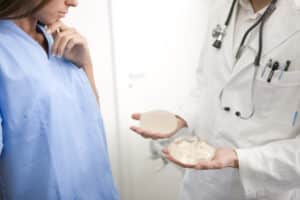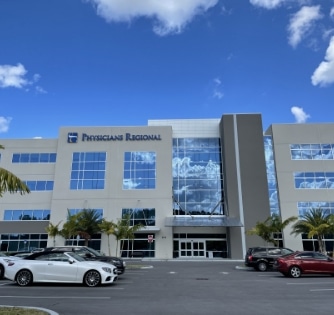Before undergoing breast implant removal, it is crucial that you speak with a board-certified plastic surgeon such as Dr. Andrew Turk. At our Naples office, Dr. Turk can address any concerns you have regarding the procedure. Dial 239-316-1689 today to schedule your personalized consultation and learn whether you are a candidate for treatment.
Patient Testimonial
"I have nothing but great things to say about Dr Turk and his staff! I have been wanting to have my procedures for a few years but have been anxious about going through. After meeting with Dr Turk and his staff I felt totally at ease. His staff is so friendly and knowledgeable. Cindy is so friendly on the phone and very helpful whenever I needed to call. Kristy did a great job answering any questions before surgery and making sure I felt prepared. Ashley, Dr Turks nurse, was so wonderful the day of surgery and the aftercare. I was so nervous walking in the day of surgery but after chatting with Ashley I felt much more relaxed. Dr Turk personally called the night of my surgery and talked to my husband to make sure I was doing alright and to see if I had any questions or concerns. During the whole process they would remind me I could always call or email with any questions or concerns. I couldn’t be happier with my results and recovery. I would highly recommend Dr Turk for anyone looking for a friendly environment and great results!"
- M.S.
What is Breast Augmentation Surgery?
Breast augmentation surgery (breast enlargement / breast enhancement) carries many of the same risks associated with other types of surgeries, such as adverse reactions to anesthesia, post-operative bleeding (hematoma), infection, swelling, fluid accumulation (seroma), redness, and pain. However, there are short- and long-term complications specific to breast implants that all breast augmentation patients should be aware of.
What are the Risks of Breast Implants?
Capsular Contracture
Capsular contracture is one of the most common problems caused by breast implants. This condition occurs when scar tissue around the implant hardens and begins to squeeze the breast implant. In addition to the hardening of the breast tissue, capsular contracture can cause pain, ripples in breast skin, movement of the breast implant, and distorted shape of the breast. Surgery may be needed to remove the scar tissue or to replace the implant.
Deflation/Rupture
The saline or silicone gel implant filling may leak out through an unsealed or damaged valve or through a rupture in the implant shell. A leakage may drain the breast implant immediately or over a longer period of time.
Leaked saline is harmlessly absorbed by the body. Leaked silicone gel may remain within the capsule around the breast implant or may spread further. Because the filling is thicker, silicone gel implants are prone to “silent rupture,” where the patient may not realize her implant is leaking. For these reasons, it is important to undergo regular follow-up exams with a physician to check that the implants are intact.
Deflation can happen at any time after surgery to one or both implants. Causes of deflation include, but are not limited to, damage from surgical instruments, overfilling or underfilling of the breast implant, capsular contracture, trauma to the breast, and normal wear and tear over time. Deflated breast implants require surgery for removal and optional replacement of the implant.
Bottoming Out
"Bottoming out" occurs when the breast implant rides too low in the breast tissue, causing the nipple to point upwards. This condition is more common in thin patients who have small amounts of breast tissue and skin coverage. There is a higher likelihood of bottoming out when the implant is placed above rather than below the chest muscle.
If bottoming out is noticeable shortly after surgery, it has most likely been caused by over-dissection of the implant pocket (the pocket was made too big). If it occurs later on, it has most likely been caused by the weight of the implant. Bottoming out can be corrected by a second surgery to recreate the pocket.
Symmastia
Symmastia occurs when the breast implants meet at the middle of the chest. This is usually a result of the implants having been placed too close together (known as over-dissection of tissue in the cleaving area), which may have been done to enhance the patient’s cleavage. Symmastia is more common in thinner women because they have less tissue over the breastbone to keep the implants apart. The condition can be corrected by reattaching the fat and underlying tissue between the implants to the breastbone, or by replacing the implants with smaller ones.
Changes in Breast and Nipple Sensation
Sensation in the nipple and/or breast can increase or decrease after breast augmentation. The change in feeling can range from numbness to intense sensitivity. This can be temporary or permanent. It may affect sexual response as well as cause discomfort while nursing a baby.
Interference With Mammography
Breast implants may interfere with the detection of breast cancer by obscuring suspicious lesions in the breast during a mammogram. The implants may also create calcium deposits around the breast that can be mistaken for cancer during a mammogram.
It is important to note, however, that breast implants have not been shown to increase the risk of breast cancer.
Dissatisfaction With Results
As with any cosmetic surgery, the results of breast augmentation may not meet your expectations. Reasons for feeling dissatisfied may include implant size, scarring, wrinkling, asymmetry, and implant displacement (shifting). These results can be minimized with pre-surgical counseling, careful surgical planning, and possible correction with additional surgery. Talk to your doctor before you undergo breast augmentation to ensure that you have realistic expectations for your implants.
The Importance of Monitoring Your Breast Implants
Because breast implants are prone to these and other complications as well as simple wear and tear over time, it is incredibly important that all breast augmentation patients have check-ups every few years after surgery to ensure that their breasts and implants are healthy. These should include physical examination as well as imaging with ultrasound, MRI or mammography. In addition, most augmentation patients will need follow-up surgery at some point in their lives to replace their aging implants with new ones.
Contact Our Naples Office For Breast Implant Removal!
Please call 239-316-1689 to schedule a consultation with Florida plastic surgeon Dr. Andrew Turk today. You can also book your meeting by clicking here and filling out our appointment request form. Our practice serves Naples & all nearby areas.


